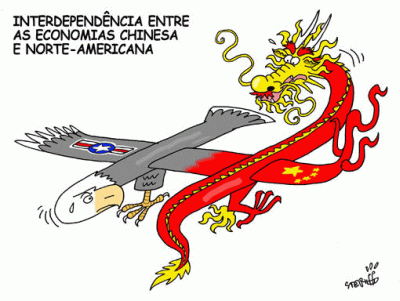
'INTERDEPENDENCE OF CHINA AND AMERICAN ECONOMIES'
[Hoje
Macau, Macau]
Al Riyadh, Saudi Arabia
'China Model' May Leave 'Washington Consensus' in the Dust
"If the Chinese model doesn't
suffer a major setback in the near term, Beijing will be able to impose its
model, extend its hegemony and redefine the principles of economic development and
the political order that were imposed by the United States."
By Dr. Abdullah Bin Abed Al Mohsin Al Faraj

Translated By Nicolas Dagher
November 21, 2009
Saudi Arabia - Al
Riyadh - Original Article (Arabic)
On the U.S. President’s recent
Asia tour, China was considered the most important. Despite insistence about a "partnership"
by Barack Obama, who is called "Balak Obama" by the
Chinese, the competition between the two countries is apparent for all to see. In
the future, China will be a powerful rival of the United States - and not in
the economic sphere alone. If in the next 20-25 years, the yellow dragon succeeds
to maintain high rates of growth, China will be the undisputed global economic
superpower.
What does this mean to us [Gulf
countries] and the rest of the world?
The answer to this question
is extremely important. But before that, let's outline some of the things that
have put China in the position it finds itself. Let us begin with the main elements
that resulted in the formation of the unique group of states that have come to
be known as the Asian economic tigers. This group emerged due to several
factors, the most important of which were:
Posted by
WORLDMEETS.US
1- The presence of strong tendency to move from
a traditional society to a modern contemporary one.
2- Sacrifice in the present for obtaining
benefits in the future. Over the past 40 years, an entire generation in China,
Malaysia, Korea, Singapore and other Asian tigers worked tirelessly to build a solid
foundation for an economy in which the present generation can enjoy its fruits.
3- The activity of multinational companies
and their determination to exploit cheap labor in Southeast Asia to maximize
profits.
The Chinese model adds to these
factors another important element, which are the ongoing transformations being led
by the public sector and not the private. That is new and important at the same
time. Although in all of Southeast Asia, the development models initially
relied on the support of the public sector, the public role began to decline in
the early 1990s, in compliance with the principles imposed by the "Washington Consensus."
[Editor's Note: Until the
economic crisis that hit last year, the Washington Consensus was the
development model for developing nations favored by the West, which included
high levels of economic liberalization, industrial privatization, and a reliance
on free markets rather than government intervention.]

President Barack Obama visits China's Great
Wall, Nov. 18.
 CLICK HERE OR CLICK PHOTO
FOR BBC COVERAGE OF TRIP'S END
CLICK HERE OR CLICK PHOTO
FOR BBC COVERAGE OF TRIP'S END
SEE ALSO ON THIS:
The Star, Malaysia:
Let's Hope a Risen China is More Responsible than U.S.
Financial Times Deutschland:
Obama's China Trip Heralds 'World Without Leadership'
Global Times, China :
The Well-Disguised
'Arrogance' Behind
Obama's Royal Bow
The Times, U.K.:
Obama Bow Shows 'Confidence'; Need
for Change After Bush
Global Times, China:
Addiction to Growth is China's 'Berlin Wall'
Global Times, China:
U.S. and Beijing Disagree on Obama's Chinese Name
Global Times, China:
Chinese Netizens Have 'Sharp Words' for President Obama
China Daily, China:
Obama Can Teach
Shanghai Officials
a Thing or Two
China Daily, China:
VIDEO - Chinese React to
Visit of President Obama
Global Times, China:
'Obscene Postcard' Emerges
of Taiwan President and Hillary
Der Spiegel:
German Editorials - Obama's Soft Approach to China Won't Succeed
The Times, U.K.
Obama's Bow to Japan Emperor
Shows U.S. 'Confidence'
The Telegraph, U.K.:
Obama 'Breaks
Conciliatory Tone';
Criticizes China Censorship
The Australian, Australia:
Obama's Personal Story No
Substitute for Policy in Asia
Globe & Mail, Canada:
China 'Plays Down' President Obama's Visit

Posted by WORLDMEETS.US
That is, if China's public
sector continues to play the role in the next twenty five years that it does
today - without this having a negative impact on economic growth - then a new
model contrary to the “Washington Consensus” will have been produced. It's well
known that since the late eighties and early nineties, the industrialized
world, due to the influence of the monetary and other schools of liberal
economics, gave up on principles that heavily relied on fiscal policy.
If it succeeds in the years
to come, the Chinese government will push through economic changes that give
the public sector a greater role in monetary policy. That is a matter of great importance.
In recent years, we in the Kingdom [Saudi Arabia] have suffered great pressure from
international economic and financial organizations pushing us to reduce public
spending and reduce government intervention in the economy.
While such pressure has eased
with the impact of the economic crisis and government bailouts approved by the
G20 to address the economic recession, no one can guarantee that such pressure will
not return after the resumption of global economic growth.
Posted by
WORLDMEETS.US
However, China may have the
last word on the matter. If the Chinese model doesn't suffer a major setback in
the near term, Beijing will be able to impose its model, extend its hegemony
and redefine the principles of economic development and the political order
that was imposed by the United States with the "Washington Consensus.”
CLICK HERE FOR ARABIC
VERSION
[Posted by
WORLDMEETS.US November 23, 6:45pm]